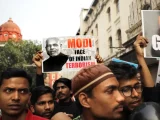
APHC Calls on Global Community to Urge India for a Peaceful Kashmir Resolution
October 7, 2024The All Parties Hurriyat Conference (APHC) has appealed to the international community to acknowledge India’s unlawful actions in Indian illegally occupied Jammu and Kashmir (IIOJK). They urge global powers to pressure New Delhi into resolving the Kashmir conflict peacefully, aligning with UN resolutions and the wishes of the Kashmiri people.
Advocate Abdul Rashid Minhas, the APHC spokesman, condemned the recent suspension of government employees and the confiscation of properties belonging to activists. He asserted that these oppressive measures would not deter the Kashmir freedom movement. Instead, the resilience of the Kashmiri people will prevail, no matter the challenges.
Minhas highlighted that the people of IIOJK do not desire to remain part of India. He noted that since the abrogation of Articles 370 and 35A in August 2019, there has been a strong rejection of Indian authority in the region. The statement underscores a significant sentiment among Kashmiris, emphasizing their struggle for self-determination.
The APHC criticized the Bharatiya Janata Party (BJP) government for using repressive tactics to silence dissent. These actions are seen as attempts to suppress the legitimate voices of Kashmiris, who seek recognition of their rights under international law. The conference reiterates that the aspiration for freedom remains steadfast among the population.
Furthermore, the APHC pointed out that many leaders advocating for Kashmir’s rights have been imprisoned by the Indian government. This crackdown on leadership illustrates India’s broader strategy to crush any movement for self-determination. Despite these oppressive conditions, the APHC remains committed to advocating for the Kashmiri people’s aspirations.
The statement urges international bodies, including the UN, Organisation of Islamic Cooperation, and European Union, to take action. The APHC calls for intervention to prevent India from banning political parties in Indian illegally occupied Jammu and Kashmir. Such bans hinder efforts to achieve a peaceful resolution to the Kashmir dispute.
The APHC emphasizes that India’s brutal tactics will not extinguish the determination of the Kashmiri people. Their quest for freedom from oppression is well-grounded. The international community’s involvement is crucial to address this long-standing conflict and uphold the rights of Kashmiris. A collaborative approach may pave the way for dialogue and resolution, reflecting the aspirations of those affected.

